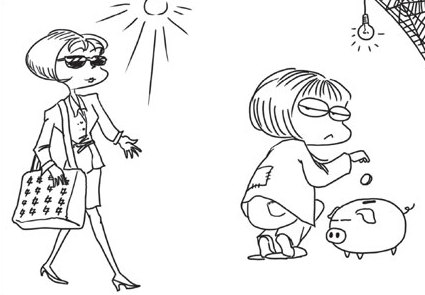Luxury shoppers prefer overseas trips
 0 Comment(s)
0 Comment(s) Print
Print E-mail
Shanghai Daily, January 13, 2012
E-mail
Shanghai Daily, January 13, 2012
|
|
|
[By Zhou Tao/Shanghai Daily] |
When it comes to the market for luxury goods, "China is the rising star," according to Claudia D'Arpizio, a Milan-based partner with the consultancy Bain & Co.
Luxury sales in China currently represent 10 percent of the global market. CLSA, a leading Asian investment bank, estimates that by 2020, China will be the largest domestic market for luxury goods in the world and will account for 44 percent of global demand.
Consumption by Chinese consumers abroad has helped fuel this growth in more mature markets in Europe.
CLSA and other firms estimate that currently more than half of Chinese luxury spending occurs overseas. Some Chinese tour groups travel to France and Italy for the sole purpose of luxury shopping.
"After decades of deprivation and conformism, Chinese consumers regard expensive consumer goods as trophies of success," reported The Economist magazine. "In public, they show off. In private, they pinch pennies."
The demand for luxury goods has increased for a number of reasons, including rapidly increasing disposable income, the increasing sophistication of Chinese consumers, and rapid urbanization and growing wealth in second- and third-tier cities.
Still, the typical Chinese luxury consumer differs greatly from his or her counterparts in more mature luxury markets. Luxury items in China are generally purchased as status symbols and not necessarily because of taste, sophistication or service. CLSA estimated that in 2010, 16 percent to 17 percent of Chinese consumers bought luxury goods as gifts, with handbags, clothing, watches and jewelry being the most popular.
Within the accessories segment, 37 percent of purchases were made for the purpose of gifting, a far greater proportion than in other markets, with only the newest and most expensive products being acceptable.
Young millionaires
According to a recent article in the Hurun Report (a Chinese publication similar to Forbes), the average Chinese millionaires are 15 years younger than their counterparts in other parts of the world, and their number has been increasing - by 6.1 percent, to nearly one million in 2010.
Finally, China's luxury goods market was previously dominated by men, due to the importance of the gift-giving culture in business. As more women have entered the workforce, the proportion of luxury goods they purchase has risen to more than half the market total.
Despite the increase in Chinese luxury goods consumption, luxury brand boutiques in China attract much less traffic than managers would like. Compared to the crowded Apple store next door, Louis Vuitton's (LV) flagship in Shanghai is empty. More and more, Chinese luxury consumers are choosing to do their luxury shopping abroad.
In recent studies, Bain found that more than 50 percent of luxury goods purchases by Chinese consumers in 2010 were made overseas.
A study by PATA/Nielsen found the average Chinese tourist in Europe purchases US$1,359 of goods per trip - more than any other nationality.
This is especially striking considering that most economists believe the yuan is significantly undervalued.
According to Xiao Qianhui, general manager of the Shanghai-based Spring International Travel Agency, most Chinese tourists consider shopping for luxury goods the main purpose of a trip to France. "Sometimes one Chinese tourist will even buy up to 20 Louis Vuitton bags at one shop," he said.
A recent survey commissioned by travel service company Global Blue found that many Chinese tourists complained about not being able to spend everything they had planned to when they were abroad. The main reasons Chinese consumers cite for shopping abroad are lower prices due to China's high luxury taxes, better selection and greater "show-off" value.
China's import tax for luxury items ranges from 20 percent for luxury bags to 50 percent for cosmetics, which, when combined with additional local taxes such as the 17 percent value-added tax, leads to a significant premium on these goods. Accordingly, the prices of LV products sold in Shanghai are about 35 percent higher than those sold in Paris.






